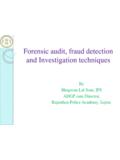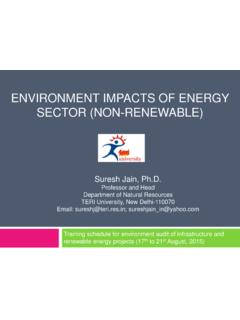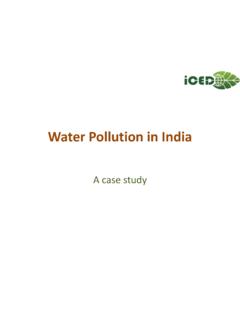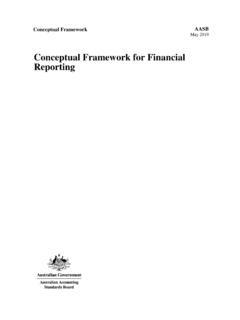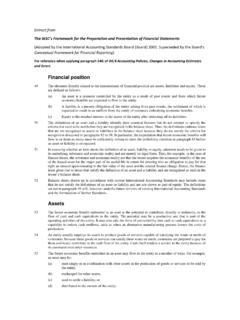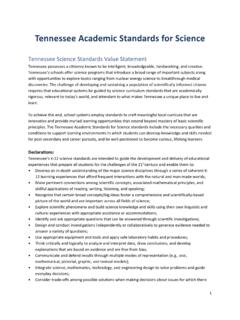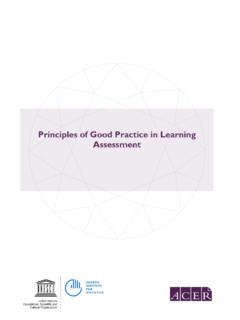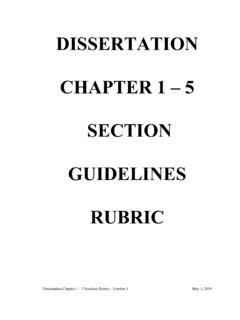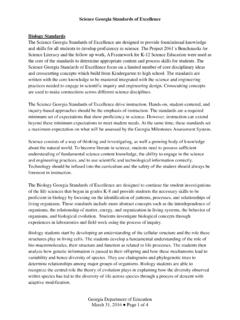Transcription of Sustainability Reporting: Concepts, Frameworks and the ...
1 Sustainability Reporting: Concepts, Frameworks and the Role of Supreme Audit 1 This publication was prepared by the INTOSAI Working Group on Environmental Auditing (WGEA). The WGEA aims to encourage the use of audit mandates and audit methods in the field of environmental protection and sustainable development by Supreme Audit Institutions (SAIs). The WGEA has the mandate to help SAIs gain a better understanding of environmental auditing issues, facilitate exchange of information and experiences among SAIs, and publish guidelines and other informative materials. This publication may be downloaded free of charge from the INTOSAI WGEA website Permission is granted to copy and distribute this publication, giving appropriate credit, provided that such copies are for academic, personal or professional use and are not sold or used for commercial gain.
2 ISBN 978-9949-9061-7-8 (PDF)June 20132 FOREWORD & ACKNOWLEDGEMENTS FOREWORD & ACKNOWLEDGEMENTS Sustainability reporting is a tool to increase transparency and accountability in the issues that traditional financial reporting is not dealing with. These include the linkages between environmental, social and economic issues as well as long-term perspective. Reporting on Sustainability matters has increased in the private sector since the 1990s. Recently, some public sector organizations have also started disclosing their Sustainability performance. This research paper introduces Sustainability reporting to public sector auditors.
3 It also discusses the implications that Sustainability reporting practices might have for Supreme Audit Institutions (SAIs) and a possible role for the International Organization for Supreme Audit Institutions (INTOSAI). With this paper, INTOSAI s Working Group on Environmental Auditing (WGEA) responds to some of the recommendations made at the twentieth International Congress of Supreme Audit Institutions (XX INCOSAI) concerning Sustainability reporting. This research project was led by Vivi Niemenmaa and Markku Turtiainen in the National Audit Office of Finland. A subgroup consisting of the SAIs of Canada (George Stuetz), Estonia (Viire Viss), New Zealand (Jonathan Keate) and the UK (Jill Goldsmith and Rosie Buckley) provided invaluable ideas, comments and support during the course of the project.
4 INTOSAI s WGEA Steering Committee provided constructive feedback. SAIs from Australia, Brazil, India, The Netherlands, South Africa and Sweden helped compile case studies that cover all continents. Important comments were also provided by Professor Amanda Ball (University of Canterbury), Gillian Fawcett (Head of Public Sector, Association of Chartered Certified Accountants, UK), and Mikael Niskala (Senior Vice President, Tofuture.) We would like to thank all these individuals and institutions for their contribution to this important topic. Alar KarisAuditor General of EstoniaChair of INTOSAI WGEAT uomas P ystiAuditor General of FinlandProject Leader3 FOREWORD AND ACKNOWLEDGEMENTS 21.
5 INTRODUCTION 5 conceptual background Purpose of this paper 72. NATURE OF Sustainability INFORMATION 83. DEVELOPMENT OF Sustainability REPORTING 114. MOTIVATIONS FOR REPORTING ABOUT Sustainability 145. REPORTING Frameworks Global reporting framework A move towards integrated reporting Country-specific initiatives 24 TABLE OF CONTENTSTABLE OF CONTENTS46. ASSURANCE OF Sustainability REPORTS Assurance standards Assurance in practice Assurance of public sector Sustainability reports 297. KEYS TO SUCCESSFUL REPORTING 318. DISCUSSION: Sustainability REPORTING AND THE SUPREME AUDIT COMMUNITY 349.
6 LITERATURE 37 APPENDIX. GRI PERFORMANCE INDICATORS ACCORDING TO GUIDANCE 40 TABLE OF CONTENTS5 INTRODUCTIONINTRODUCTION6 Sustainable development as a concept was launched in the late 1980s. The UN s Brundtland report defined it as development that meets the needs of the present without compromising the ability of future generations to meet their own needs .1 Although the concept is contested, it serves as a valuable tool in scrutinizing complex issues. Theoretically, the concept is tied to the stream of ecological modernization which argues that economic growth and ecological concerns can be favorably Sustainability recognizes the interdependence of economic, social and environmental factors.
7 With reference to future generations it is also forward-looking. On the macroeconomic level, Sustainability has been linked to arguments about national accounting and limitations of using GDP as an indicator of economic performance and social progress. For example, traffic jams may increase GDP as a result of the increased use of gasoline, but obviously not the quality of life or the state of the As a consequence, there is increasing interest in developing new welfare indexes, such as the creation of gross happiness indexes, originally invented in Bhutan. At a national level, there is also the development of environmental Environmental accounts have been created to complement national financial accounts, by detailing the full economic costs of natural resources used and environmental effects concerns have been introduced to the debate about organization-level annual reporting as well.
8 In most countries, private and public organizations are required by law to publish an annual report on their financial performance. It contains all the relevant financial information and is presented in a structured manner. Usually, a financial report or financial statement is audited by an external auditor in order to provide the user of the accounts with reasonable assurance about its completeness and accuracy and, in the public sector, to attest the proper financial accountability of the audited entity. Corporate decision-making is often heavily reliant on financial information, although this information may not give a complete picture about an organization and the environment in which it operates.
9 The success of an organization might not only depend on its financial results, but also on issues such as its capacity to reduce greenhouse gases or its efficient use of resources. Environmental and Sustainability issues are not only a moral concern, but are increasingly important because of their financial significance. Another example is how an organization can act in order to maintain employee and customer satisfaction. These examples are related to the growing importance of corporate governance in the private sector and good governance in the public sector. These kinds of issues cannot be reported solely through the use of traditional financial order to provide such a broader perspective on their performance, some organizations have started to report their performance on environmental issues, social responsibility or sustainable development, alongside financial issues.
10 Sustainability reporting is a systematic tool to gather and present Sustainability information for the management process, and to stakeholders such as employees, shareholders, customers, local communities, NGOs, investors or financial analysts. Whether organizations choose to report or not, information that affects the environment and communities has become more easily available with globalization and social media platforms. Some organizations are choosing to report this wider performance to avoid appearing not to care about these issues and to improve their reputations. Sustainability reporting started with private sector companies.
